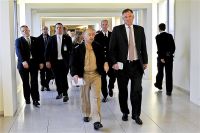BRUSSELS, Belgium — Deputy Defense Secretary William J. Lynn III met with NATO and U.S. leaders at the alliance headquarters here today to discuss the way forward in cybersecurity.
At the alliance’s November summit in Lisbon, Portugal, NATO’s heads of state and leaders of government agreed that the threats in cyberspace have grown and that the alliance must confront them.
The threats are more frequent, more organized and more costly, a joint statement released at the summit said, and “they can reach a threshold that threatens national and Euro-Atlantic prosperity, security and stability.”
The threats, the statement added, can come from foreign militaries and intelligence services, organized crime, terrorist and extremist groups, or even individuals.
In Lisbon, NATO leaders called on the alliance to develop the ability to prevent, detect, defend against and recover from cyber attacks. The alliance must protect critical networks and put in place processes to leverage national cyber defense capabilities, the alliance’s leaders added.
Partnerships between the public and private sectors are essential, as government and military networks routinely use private networks to communicate. Lynn furthered the public-private partnership concept during a roundtable at NATO this morning. Accompanied by Navy Adm. James G. Stavridis, NATO’s supreme allied commander for Europe, the deputy secretary stressed the need for public and private entities to work together to find a balance between openness and security, according to defense officials present at the meeting.
Tomorrow, Lynn continues the cybersecurity conversation by taking part in a high-level meeting of national policy advisors on NATO cyber defense at the alliance’s headquarters. He also will meet with European Union High Representative Catherine Ashton and the newly appointed chief executive of the European Defense Agency, Claude-France Arnould.
Source:
U.S. Department of Defense
Office of the Assistant Secretary of Defense (Public Affairs)

 von
von 